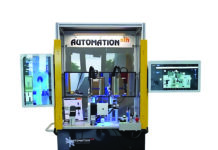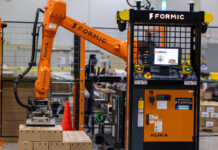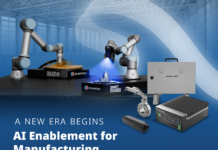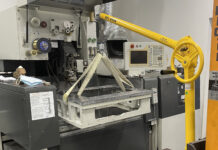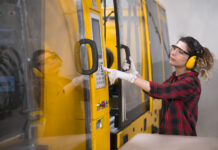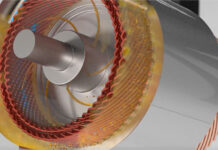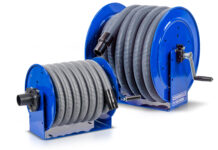Dial Machine’s relationship with OEMs spans 50 years” font_container=”tag:p|font_size:16|text_align:center|color:%23ffffff|line_height:1.5″ google_fonts=”font_family:Lato%3A100%2C100italic%2C300%2C300italic%2Cregular%2Citalic%2C700%2C700italic%2C900%2C900italic|font_style:700%20bold%20italic%3A700%3Aitalic” css=”.vc_custom_1443819032534{padding-top: 5px !important;padding-right: 5px !important;padding-bottom: 5px !important;padding-left: 5px !important;background-color: #76c043 !important;}”]
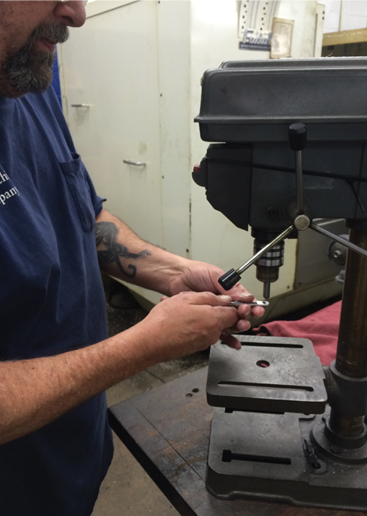 While longevity – measured as years in business with consistent ownership – is not a typical requirement for OEMs in choosing a precision metal parts manufacturer, there are some significant reasons why it should be considered along with the usual quartet of quality, delivery, turnaround and price.
While longevity – measured as years in business with consistent ownership – is not a typical requirement for OEMs in choosing a precision metal parts manufacturer, there are some significant reasons why it should be considered along with the usual quartet of quality, delivery, turnaround and price.
Longevity does impart certain, undeniable facts. In an era where many machine shops have gone out of business or changed hands as parts manufacturing moved overseas, those that have survived could only do so by being lean and delivering consistent value.
Often, this meant adapting by moving to more precision, low tolerance work that remained in the U.S. To win this business, shops were forced to recruit or retrain skilled operators from a diminishing pool while continually investing in the latest CNC equipment over time. This meant spending more money to stay ahead of the curve when many jobs were becoming “lowest bid wins.”
For industries that are more price-sensitive, competition amongst the quality shops was fierce and the only way to stay in business was to deliver consistent quality, on time – every time. Fail do so, and another precision shop is there to take its place.
In other words, longevity – particularly when measured in decades – is like a gauntlet that only the strong survive. Not many can lay claim to being in business for the past 20, 30, 40 or more years.
50 years in business, 50 year customer
One metal parts supplier able to negotiate the rigors of the industry, and of time, is Dial Machine Company (dialmachine.net), a full service precision machine shop offering custom metal and plastic components. The company has operated under the same family ownership and retained long term skilled operators for the past 50 years.
If the company’s 50-years in business is impressive, perhaps more so is that Dial Machine has maintained a continuous 50-year relationship with the same customer, King Tester Corporation, a pioneer of Brinell hardness testing equipment.
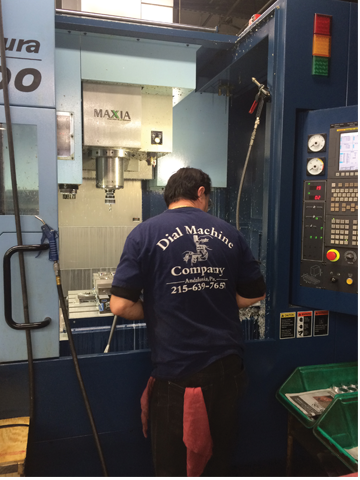 Given the failure rate of manufacturers, revolving door ownership or management (often that make sweeping changes, including where they get their parts), changes in the industry, competitors looking to steal away business by offering a lower price, any machine shop will acknowledge that retaining a customer over decades is perhaps even tougher than staying in business.
Given the failure rate of manufacturers, revolving door ownership or management (often that make sweeping changes, including where they get their parts), changes in the industry, competitors looking to steal away business by offering a lower price, any machine shop will acknowledge that retaining a customer over decades is perhaps even tougher than staying in business.
The relationship between these two companies is unusually long for its time frame and cooperation. During that time, they have witnessed many changes in the industry, most notably the introduction and evolution of CNC machining.
“In the 1980s, machining had reached its limits, with rising quality demands and many skilled machinists retiring,” says Ernest Biddle, King Tester’s V.P. of Sales and Marketing. “Dial Machine was our first supplier to use CNC machines to enhance and extend quality machining. We supported this technical revolution and co-signed their loan for CNC equipment, because fast, accurate production of our test head was critical to our business.”
Since 1965, Dial Machine has been the primary parts supplier for the King portable Brinell hardness tester, providing parts for its hydraulic test head, body, and base. Dial handles not only primary processes such as CNC machining, metal fabrication, lathe and milling operations, but also secondary machining, finishing, coating, deburring, grinding, and some assembly.
Biddle acknowledges the role of John Giordano, co-owner of Dial Machine and son of its founder Anthony, in helping to produce the world’s first commercially viable, automatic Brinell microscope, King Tester’s King Scan®, which since 1987 has gone through a number of iterations and improvements.
Despite the role that longevity can play in an OEM choosing an experienced metal parts manufacturer, simply being around a long time isn’t enough when it comes to precision parts. With each new generation of CNC equipment, the precision and speed increases and companies such as Dial Machine must continue to invest in new machines while refining their techniques.
“On key parts of our portable Brinell hardness tester, such as the process of making test heads, Dial Machine works to very tight tolerances,” says Simon Focht, King Tester’s Operations Manager. “From a raw casting, a block of stainless steel, it essentially machines the exterior and interior in fine detail. At another point, it machines and drills a block of aluminum, using CNC equipment to achieve several tasks at the same time.”
Recently, Giordano also suggested design improvements to tighten the mating fit between two elevating screws and nuts on the King Brinell hardness tester base. “With the improved tolerance of the custom mating fit, the carriage runs up and down as precisely as possible with increased longevity,” says Focht.
Staying Current
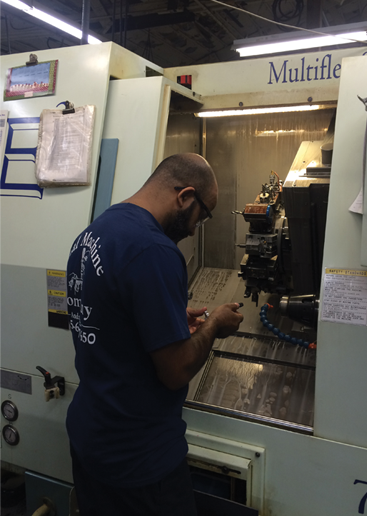 “A machine shop has to prove itself every day,” agrees Jim Guba, Vice President of Engineering at IMAC Systems. His company, which has worked with Dial Machine for the past 5 years, provides products and services to the gas measurement and precision machining industry since its establishment in 1978. “They continue to improve their business and bring in the latest, state-of-the-art CNC equipment.”
“A machine shop has to prove itself every day,” agrees Jim Guba, Vice President of Engineering at IMAC Systems. His company, which has worked with Dial Machine for the past 5 years, provides products and services to the gas measurement and precision machining industry since its establishment in 1978. “They continue to improve their business and bring in the latest, state-of-the-art CNC equipment.”
Although IMAC Systems has invested in sophisticated CNC equipment – including two new CNC lathes totaling $500,000 to add to two CNC lathes, a milling machine, and a machining center – it still sees the value of outsourcing its most complex parts to a precision shop like Dial Machine.
Although they could manufacture the parts, they prefer to use in-house equipment to make the majority of less-complex parts – a job that requires the full attention of their current long-time CNC operator.
The complex parts Dial Machine makes include the upper and lower housings of a high-pressure stainless steel filter, which protects expensive downstream gas equipment from dangerous line debris. The tolerances for the high-pressure filter can range from 0.0005” to 0.005” in 316” stainless steel.
“We’ve never had a reject from any part they’ve made for us in five years,” says Guba.
Lights Out Manufacturing
Despite Dial Machine’s long, successful OEM relationships, the company is not resting on its laurels. To gain even greater operational efficiency, it has gone beyond CNC machining to lights out manufacturing.
Lights out manufacturing is a trend where CNC equipment is set up to make parts overnight or longer, while staff is not around. This can speed part turnaround while also reducing labor costs, which can be passed on to the customer.
The technique often improves OEM production flexibility as well, leaving fully manned CNC equipment for day shifts to produce more complex parts that may require more tooling changeovers and monitoring.
As much as 80% of the work Dial Machine performs can be run as lights out manufacturing, provided that lot quantities are sufficient. These automated machines have automatic magazine bar feeders and safety mechanisms on them. This allows the company to run multiple shifts per day, including an unattended overnight shift, which can dramatically decrease OEM lead times and part costs.
“With CNC and lights out manufacturing capability as well as expert machinists, Dial Machine is helping to keep our company on the cutting edge of quality, delivery, and price,” concludes Biddle.
For more information, please visit:
www.dialmachine.net
Or contact:
dialmachoffice@verizon.net

